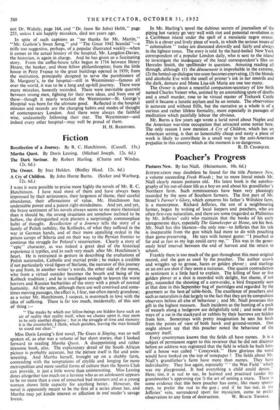Poacher's Progress
Pastures New. By Ian Niall. (Heinemann. 10s. 6d.) JUSTIFICATION may doubtless be found for the title Pastures New, a volume succeeding Fresh Woods ; but to more literal. minds Mr. Niall clearly means pastures old. His latest book is the autobio- graphy of his out-of-door life as a boy on and about his grandfather's Northern farm. Such reminiscences have been very pleasingly recorded by the sons of Southern farmers. The first part of Mr. Street's Farmer's Glory, which concerns his father's Wiltshire farm, is a masterpiece. Richard Jefferies, the son of a neighbouring farmer, began by writing of local keepers and poachers, who are often first-rate naturalists, and there are some (regarded as Philistines by Mr. Jefferies' cult) who maintain that the books of his early unregenerate days, especially The Gamekeeper at Home, are his best. Mr. Niall has this likeness—the only one—to Jefferies that his tale is inseparable from the gun which had more to do with poaching than game-preserving. He' says with honest gusto: "I poached as far and as fast as my legs could carry me." This was in the gener- ously brief interval between the end of harvest and the return to school.
Frankly there is too much of the gun throughout this most original record, and the gun as used by the poacher. The author crawls and wriggles up to grouse, hares or golden plover ; and starlings or an owl are shot if they seem a nuisance. One quaint contradiction in sentiment is a little hard to explain. The killing of four or five golden plover at a shot is recorded with delight, but shame, if not pity, succeeded the shooting of a corn-crake, a bird frequently seen at that date in this September bag of partridges and regarded by the . gourmets as the best-ef table-birds. The excellence of poachers and such as naturalists is due largely to the fact that they are by compulsion observers before all else of behaviour ; and Mr. Niall possesses this gift in the highest measure. Such incidents as the hunting of a pack of weasels along a hedgerow are delightfully told ; and none of the ways of a rat in the stackyard or rabbits by their burrows are hidden from him. Sometimes with pretty imagination he sees his birds from the points of view of both hawk and ground-vermin. One might almost say that this poacher noted the behaviour of the country itself.
Every countryman knows that the fields all have names. It is a subject of permanent regret to this reviewer that he did not discover before an address was registered that the field in which he built him- self a house was called " Coneywick." How glorious the word would have looked on the top of notepaper ! The fields about Mr. Niall's grandfather's farm have more than names. They have individuality. They live again, especially " the Wee Field ' which was my playground. It had everything a child could desire." Here; too, it is sad to say, he learned and practised (under his grandmother's approving eye !) the art of setting a snare. There is some evidence that this born poacher has come, like many sports- men, to prefer the rod to the gun ; and if he has not, in the Jefferies' vein, surrendered sport for mysticism, come to prefer
observation to any form of destruction. W. BEACH THOMAS.


































 Previous page
Previous page